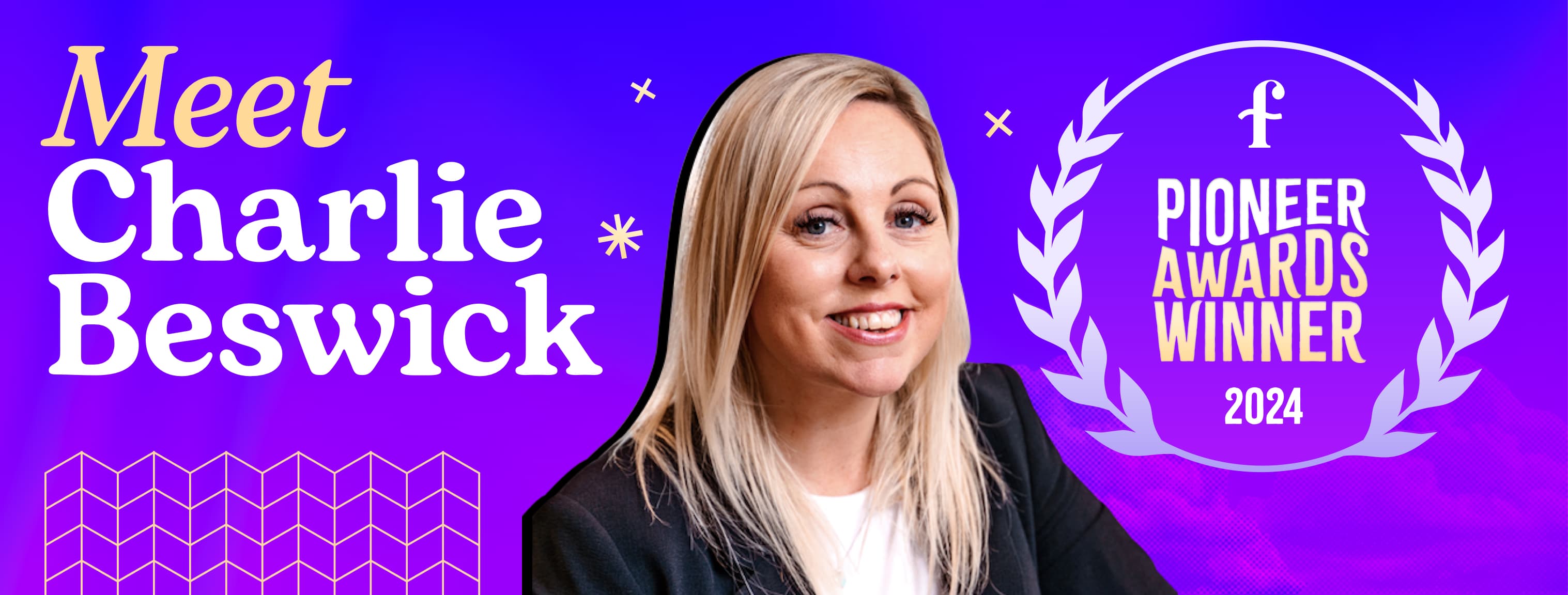Pioneer Profile: Charlie Beswick
Meet Charlie Beswick, Flexa Pioneer Award winner, carer, author, and advocate for parent carers. Charlie shares insights from her career journey, her passion for supporting parent carers, and her vision for the future of work.
12th Nov 2024
• 5 minutes

It’s time that we recognise the people behind the evolving world of work. Our working lives have shifted to being more inclusive, more people-centric, more flexible, and just plain better for both employees and companies.
These changes didn’t just happen: they were put into place and upheld by individuals and teams working to create a better working future for everyone.
So we’re finally putting the spotlight on the people who make great companies great: the people-people.
People-people are crucial to the success of every company. They find you the talent that drives you forwards, and they’ve taken on an increasingly strategic role in the past few years – often taking on responsibility for mental health, diversity and inclusion, culture, EVPs, Employer Branding and team happiness.
Read more about the Pioneers List and go behind the scenes to understand how and why we’ve selected our Pioneers.
We were lucky enough to speak with Charlie Beswick, carer, author, and advocate for parent carers about her career and hopes for the future of work.
Tell us a little bit about your career history, and how you got to where you are now. What were the key milestones?
Thanks so much. Where to start! While I was completing my psychology degree in 2002 I wanted to become a clinical psychologist supporting children who had experienced trauma. After graduating, I applied for a job to set up the first behaviour unit for excluded primary school children because I thought the interview experience would be valuable and I got the job! That led me down the path of education where I worked for the next 20 years, 16 of which as a teacher both in primary and secondary schools.
During that time I also became a mum to twins Oliver and Harry. Harry was born with a rare craniofacial condition requiring a lot of surgeries and he is also autistic and requires 1-1 care. The time demands and care responsibilities meant that, as a single parent after my marriage broke down, I couldn't teach full time anymore. I worked part time as a secondary school teacher but wanted to use my experience, of surviving and then thriving in a life I would never have chosen, to help others.
I began to mentor others alongside my teaching role who were struggling with life changes, and I joined LinkedIn where I shared my views on resilience, the power of self talk and change management. There is a lot going on in the general space of wellbeing and I got some work and interest but nothing that lit me up and made me feel like I was making a positive difference. I started sharing stories of my boys and our life together and soon, companies were approaching me asking if I could deliver sessions on awareness of being a parent carer.
Since then, I have been building a community of people who value my journey and see how important my mission is to support carers in the workplace. I truly feel that I am now making a difference and in September 2019, this became my only job. Self-employment is definitely a learning curve but so far, I am loving it.
When did you become interested in the future of work?
Once I was a member of the workforce, and certainly as someone who has barriers at times to accessing work, I became very aware of the importance and value of great leadership and the power of trust and loyalty. I have worked for terrible bosses who made the workplace hostile and somewhere I didn't want to be and I have worked for leaders who valued, supported and encouraged me and as a result I gave them the very best of myself. I think the combination of my love of people (hence the psychology degree) and the importance of self reflection in teaching, has made me curious about what makes great workplaces, teams and leaders. As I have got older and, more recently thanks to the power of LinkedIn, I am excited to be partnering with organisations who are keen to actually shape the landscape of work and that is a huge privilege.
What is the most impactful change that you’ve implemented?
More people are recognising that they are carers and seeing that they need and deserve more support. This is being done within awareness sessions of companies who are proactively looking to support those who need it and so it has been incredibly rewarding to know that carers feel seen and valued and also that they are getting the support they deserve.
What’s the biggest challenge of being in your role/industry right now?
I'd say organisations often don't think they have many carers in their workplace so can be reluctant to engage in proactive support. Countless studies have shown that carers often don't share their caring responsibilities with employers for the fear of the implications and stigma so that's always a challenge. However, legislation for carers is improving all the time and the numbers of carers are increasing year on year so I love working with organisations who want to be ahead of the inevitable changes and do the right thing, for the right people, for the right reasons.
What do you think the next big trend is in working culture?
I think flexible working will continue to be high on the agenda with hybrid working and compressed hours being a focus so that work life balance can be prioritised and supported. With social media being as influential as it is, it's in companies interests to be looking after their teams so that the reputation that precedes them is a great one (although I hope that's not the main motivating factor!)